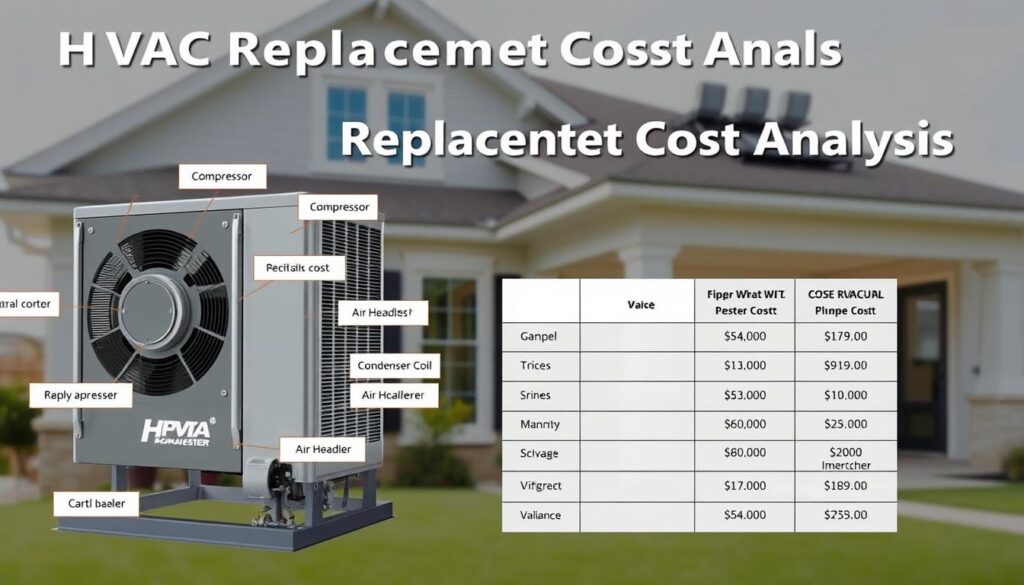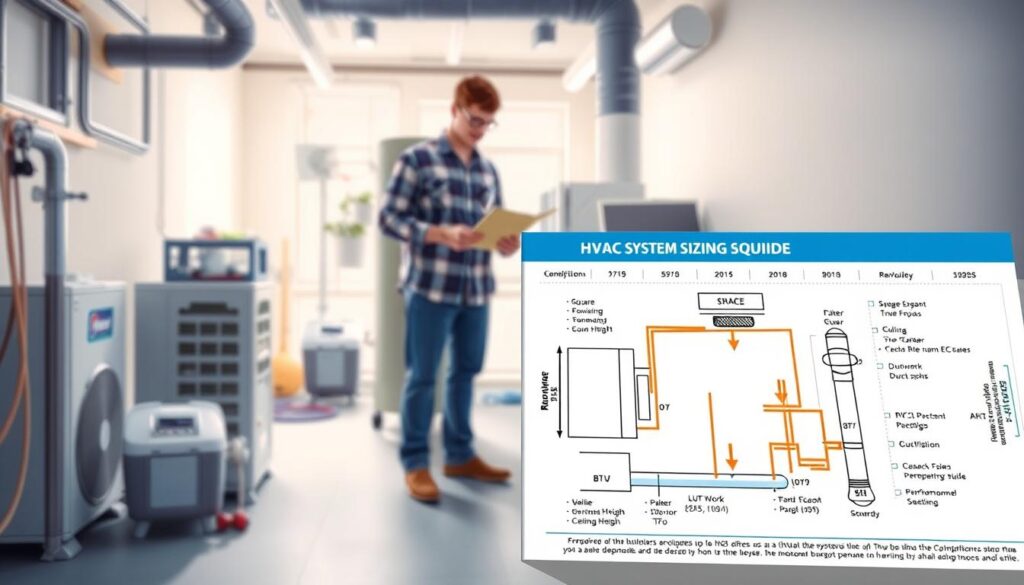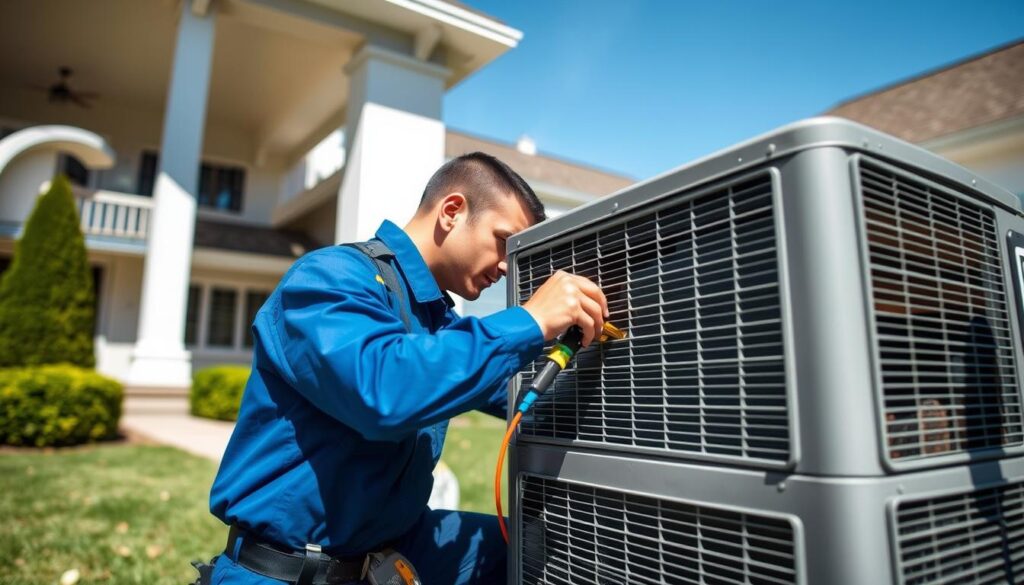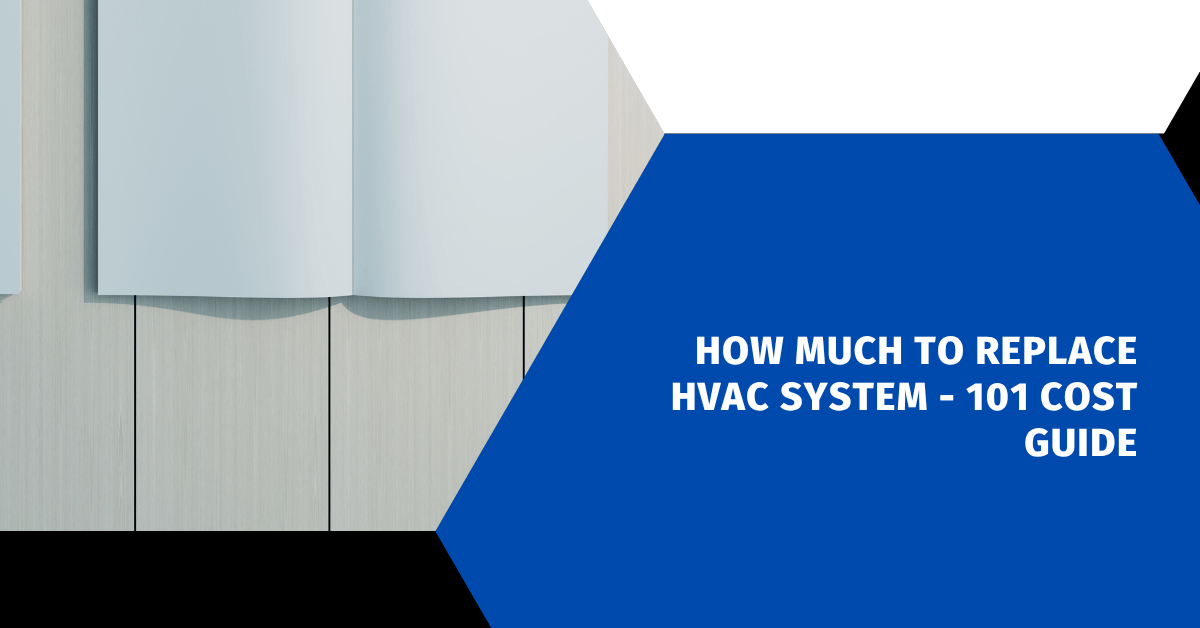Affiliate Disclosure
HVAC Guide Guys is a participant in the Amazon Services LLC Associates Program, an affiliate advertising program designed to provide a means for sites to earn advertising fees by advertising and linking to Amazon.
How Much to Replace HVAC System? Are you curious about the cost of a new HVAC system for your home? It can seem like a puzzle with many numbers and choices.

Getting a new HVAC system is a big deal for homeowners. The cost to replace it varies from $5,000 to $12,500. This depends on your home’s size, the system’s complexity, and local rules.
If you’re looking to improve your home’s heating and cooling, knowing the costs is key. This guide will help you understand the costs of replacing your HVAC system. It aims to help you choose wisely, balancing comfort, efficiency, and your budget.
Key Takeaways
- Average HVAC replacement costs range from $5,000 to $12,500
- Total expenses depend on home size and system complexity
- Energy efficiency can impact long-term financial savings
- Professional assessment is key for accurate cost estimation
- Many financing options are available for HVAC upgrades
Table of Contents
Understanding HVAC System Replacement Costs
Replacing your home’s HVAC system is a big deal. It needs careful planning and a good budget. The cost can change a lot based on several important factors.
Expect to spend between $5,000 and $15,000 for a new HVAC system. The cost of replacing the AC unit and furnace adds up a lot.
Average Cost Range for New Installation
How much you’ll pay depends on a few things:
- Home square footage
- System complexity
- Energy efficiency ratings
- Geographic location
Factors Affecting Total Cost
Several things can change how much you’ll spend:
- System Type: Central air costs more than individual units
- Energy Efficiency: Better SEER ratings mean more upfront cost but save money in the long run
- Home Size: Bigger homes need more powerful, expensive systems
Cost Breakdown by Components
Knowing the cost of replacing the furnace helps with budgeting. Here are typical costs for different parts:
- AC unit: $3,000 – $7,000
- Furnace: $2,500 – $6,000
- Ductwork modifications: $500 – $3,000
“Invest wisely in your HVAC system—it’s not just an expense, but a long-term home comfort solution.”
Types of HVAC Systems and Their Price Points
Choosing the right heating and cooling system is key to your home’s comfort and energy use. Each system has its own features, performance, and cost. These factors can guide your choice.
Today, homeowners have many HVAC options. Each has its own benefits and price tags:
- Split systems with separate indoor and outdoor units
- Ductless mini-split configurations
- Packaged heating and cooling units
- Hybrid heat pump systems
Central Air Conditioning Systems
Central air is a top pick for cooling your whole home. Prices vary from $3,000 to $7,000, based on your home’s size and needs. They cool rooms evenly through ducts.
Heat Pump Systems
Heat pumps do it all: heat and cool your home. Electric heat pumps are energy-smart. Costs range from $4,000 to $8,000, influenced by system complexity.
Furnace Options and Costs
Choosing a furnace depends on your climate and home setup. Gas furnaces are the most common, priced from $2,500 to $6,000. Electric furnaces are cheaper upfront but cost more to run.
Pro tip: Always consult with a professional HVAC technician to determine the most suitable system for your specific home needs.
Explore Our HVAC Shop
Looking for top-rated HVAC tools, parts, and accessories? Visit our shop and find the perfect solution for your needs.
Visit the ShopHow Much to Replace HVAC System: Complete Pricing Guide
Knowing the cost to replace your HVAC system is key to planning your budget. The price can vary a lot based on several important factors. These factors affect how much you’ll pay in total.
Homeowners should expect to spend between $5,500 and $16,000 on a new HVAC system. Your exact cost will depend on several things:
- Home square footage
- System efficiency ratings
- Local labor rates
- Equipment brand and quality
- Complexity of installation
Looking closer at the cost, a standard 3-ton unit for a 2,000-square-foot home costs about $5,750. This price covers the equipment and basic installation. But, your situation might need extra considerations.
Several things can affect the price of replacing your HVAC system:
- System Type: Central air conditioning systems cost differently than heat pumps
- Energy Efficiency: Higher SEER ratings mean higher upfront costs but save money in the long run
- Regional Climate: Your local weather affects what system you need
Planning ahead for your HVAC replacement helps you make smart financial choices. It can also help you save money by making the right decisions.
Size and Capacity Considerations for Your Home
Choosing the right HVAC system for your home is key to comfort and budget. The size and capacity of your system affect its performance and costs. This includes energy efficiency and long-term costs.

Professional HVAC technicians know that one size doesn’t fit all. Several important factors help decide the best system for your home:
- Square footage of your living space
- Ceiling height and room configurations
- Insulation quality
- Window placement and energy efficiency
- Local climate conditions
Square Footage Requirements
Your home’s square footage is the first step in finding the right HVAC system size. Typically, you’ll need about 20 BTUs per square foot of living space. But, this is just a starting point that needs more detailed work.
“Proper sizing is the key to maximizing your energy efficient hvac system cost and overall home comfort.” – HVAC Industry Expert
BTU Calculations
BTU calculations are more than just square footage. Technicians look at many factors to find the exact cooling or heating your home needs. This helps avoid systems that work too hard or not hard enough, saving on energy costs.
Climate Zone Impact
Your location affects your HVAC system choice. Different climates need different heating and cooling levels. For example, homes in Arizona need more than those in Minnesota, affecting your budget and system needs.
Understanding these sizing factors helps you make a smart choice. It balances comfort, efficiency, and cost.
HVAC Energy Efficiency Ratings and Cost Benefits
It’s key to understand energy efficiency ratings when choosing an HVAC system. The cost of an energy-efficient HVAC system can change a lot based on its ratings. Today’s HVAC systems are rated by SEER (Seasonal Energy Efficiency Ratio), which shows how well they cool.
Starting in 2023, new air conditioning units must meet certain standards:
- Northern states: Minimum 14 SEER rating
- Southern states: Minimum 15 SEER rating
Higher SEER ratings mean less energy use and lower bills. When looking at the cost of upgrading your HVAC, remember to think about the long-term savings on energy.
| SEER Rating | Energy Efficiency | Estimated Annual Savings |
|---|---|---|
| 14-16 SEER | Standard Efficiency | $50-$100 |
| 17-20 SEER | High Efficiency | $100-$250 |
| 21-26 SEER | Premium Efficiency | $250-$500 |
Choosing a high-efficiency HVAC system can save you a lot. Energy Star certified units can cut cooling costs by up to 15%. This makes them a smart choice for those watching their budget.
Pro tip: Always compare the total cost of ownership, not just the upfront price when selecting an energy-efficient HVAC system.
Explore Our HVAC Shop
Looking for top-rated HVAC tools, parts, and accessories? Visit our shop and find the perfect solution for your needs.
Visit the ShopInstallation Costs and Labor Expenses

When planning a new HVAC installation, it’s key to understand labor costs. These costs are a big part of the overall price. They can affect your budget for the project.
Getting a professional to install your HVAC is important. It makes sure your system works well and safely. Labor costs usually make up 40-50% of the total cost. This is a big part of your budget.
Professional Installation Requirements
Qualified HVAC technicians are vital for your installation. They do many important tasks. These include:
- Removing old HVAC equipment
- Preparing the installation site
- Placing the system correctly
- Connecting electrical and refrigerant lines
- Testing and calibrating the system
Permit and Inspection Fees
Local rules need specific permits for HVAC installations. These fees change by location but are key for safety and code compliance.
- Permit costs range from $250-$500
- City inspection fees are $100-$200
- More inspections might be needed
Additional Installation Materials
There are extra materials that add to the cost:
- Refrigerant lines
- Mounting brackets
- Electrical wiring
- Insulation materials
- Condensate drain lines
Choosing professional installation is worth it. It ensures your system works great and saves you money on repairs later.
Ductwork Replacement and Modifications
When you’re planning to replace your home’s HVAC, don’t forget about the ductwork. It’s a key part that many people miss. Your ductwork affects how well your new HVAC system works.
Old or damaged ducts can raise your hvac upgrade cost. Experts say bad ducts can cut system efficiency by 20-30%. This means higher energy bills and less comfort.
- Inspect ductwork before new HVAC installation
- Check for air leaks, dust buildup, and physical damage
- Consider replacement if ducts are over 15 years old
The cost for new ductwork can be $1,000 to $3,000. This is a smart investment. It can make your home’s air flow better, save energy, and improve your HVAC system’s performance.
Several things can change how much ductwork changes cost:
- Total square footage of your home
- Complexity of duct layout
- Material quality
- Accessibility of existing ductwork
Professional HVAC techs can tell if you need new ducts or repairs. Getting your ductwork right ensures your new HVAC system works best. This can save you money over time.
HVAC Brands and Their Price Ranges
Choosing the right HVAC brand is key to your ac unit replacement cost and system performance. Knowing the different price tiers helps you find a balance between quality and budget.
Manufacturers offer three main categories for furnace replacement: premium, mid-range, and budget-friendly. Each category has its own benefits and considerations for homeowners.
Premium Brands: Top-Tier Performance
Premium HVAC brands are known for their high quality and advanced features. They invest a lot in technology and innovation.
- Carrier
- Lennox
- Trane
Mid-Range Options: Balanced Performance
Mid-range brands offer reliable performance at a lower price. They provide good warranties and consistent efficiency.
- Rheem
- Goodman
- Armstrong
Budget-Friendly Choices: Economic Solutions
Budget brands aim to provide affordable HVAC solutions. They work well for those on a tight budget.
- York
- Payne
- Daikin
| Brand Category | Average Cost Range | Warranty |
|---|---|---|
| Premium | $6,000 – $12,000 | 10-12 years |
| Mid-Range | $4,000 – $7,500 | 5-10 years |
| Budget-Friendly | $3,000 – $5,500 | 5-7 years |
Your ac unit replacement cost depends on several factors. These include system size, efficiency ratings, and local installation costs. Always talk to professional HVAC technicians to find the best option for your home.
Explore Our HVAC Shop
Looking for top-rated HVAC tools, parts, and accessories? Visit our shop and find the perfect solution for your needs.
Visit the ShopFinancing Options for HVAC Replacement
Managing your home hvac replacement budget can feel overwhelming. This is true when facing big hvac replacement costs. Luckily, there are many financing options to help. They make upgrading your HVAC system more affordable.
Homeowners have several financing routes to explore for their HVAC investment:
- Personal Loans: Quick approval with fixed interest rates
- Home Equity Loans: Lower interest rates, possible tax deductions
- HELOC (Home Equity Line of Credit): Flexible borrowing options
- Manufacturer Financing: Specialized programs with competitive terms
Each financing method has its own benefits. Personal loans offer quick funding without needing collateral. Home equity options usually have lower interest rates. Some manufacturers even have special financing programs for HVAC replacements.
| Financing Option | Average Interest Rate | Typical Loan Term |
|---|---|---|
| Personal Loans | 6.5% – 36% | 1-7 years |
| Home Equity Loans | 4% – 10% | 5-30 years |
| HELOC | 3% – 8% | 10-20 years |
Pro tip: Look for energy-efficient tax credits or local rebates. They can help lower your HVAC replacement costs. Some utility companies give incentives for high-efficiency systems.
“Smart financing can transform a significant expense into a manageable investment in your home’s comfort and value.” – HVAC Financial Experts
Before picking a financing option, check your credit score and compare interest rates. Think about your long-term financial goals. The right financing can make your HVAC replacement budget easier to handle. It ensures your home stays comfortable and energy-efficient.
Conclusion
Figuring out when to replace your HVAC system is important. It depends on your home’s size, how energy-efficient you need it, and what your system needs. ENERGY STAR says you should replace it every 10 to 15 years for best performance and energy use.
Replacing your HVAC system early can save you a lot of money. High-efficiency systems use less energy and lower your bills. Getting it installed right and choosing the right system for your home will make your investment worth it.
Get quotes from certified HVAC pros, look at different systems, and think about saving on energy. Look at your budget, what your home needs, and financing options. This will help you make a smart choice that balances cost now and performance later.
Replacing your HVAC system the right way can make your home more comfortable, cut down on energy costs, and even increase your home’s value. Doing your research, planning, and getting expert advice are essential for a successful replacement.

